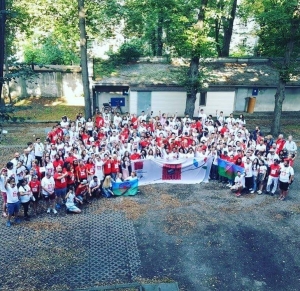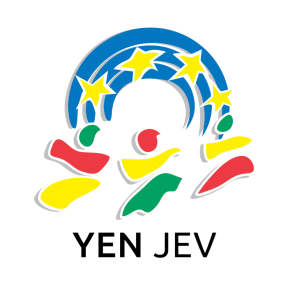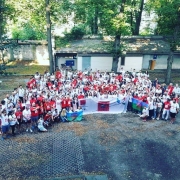Impressions from Krakow – Dikh He Na Bister
Andor Barabás is a Minority Messenger. In September and October 2019 he is supporting the Office of YEN in Berlin as an intern. Before, in July 2019 he was in Krakow for the Dikh He Na Bister as Minority Messenger.
Andor comes from Romania, he belongs to both Hungarian and German Minority and studies Leadership and Communication in International Organizations. He likes to learn about contemporary history, international relations, diplomacy and European politics. Watching ice-hockey and reading are some of his hobbies and he tries to engage himself actively in youth organizations and in different volunteering projects.
Dikh He Na Bister means “Look and don’t forget” is an initiative to remember Roma Genocide. Since 2010 there is a youth event organised in Krakow bringing young people from Europe, who discuss the subject of Roma Genocide and Roma minority one week long. More information: http://2august.eu

What is Dikh He Na Bister and who is there?
Dikh He Na Bister is a youth event that takes place every year around the 2nd of August, the European Roma Holocaust Memorial Day, in Krakow, Poland. About 500 Roma and non-Roma teenagers from across Europe gather together for a week to learn, understand and reflect about the past and present struggle of the Roma in the world.
The activities during this week are very educational and emotional. Speaking about education, the participants get to learn more about Roma history and culture and they acquire knowledge of the role of youth in addressing current challenges of antigypsyism and other forms of racism in Europe today. From the emotional point of view, participants have the chance to meet with Holocaust survivors, visit the Auschwitz-Birkenau State Museum and take part at the official commemoration ceremony on the 2nd of August at the memorial for the murdered Roma and Sinti in Birkenau.
What made the greatest impression on you that you took home?
The first thing that surprised me right after I arrived at the event was my prejudiced thinking and the stereotypes that were running in my head. In Romania we have a big Roma community and the majority of the Romanian society has something to hold against Roma people. I have never dealt before with the Roma community so it was natural for me to see only the negative aspects. But this way of thinking changed very fast when I started to talk with the participants and I learned more about their community. I am very happy to say that this event changed my way of thinking and helped me realise that Roma are people just like everyone else and that I have to do something in my society and country to break these stereotypes.
The second thing that impressed me was the group of participants from Finland. Participants usually travel to Dikh He Na Bister in national groups and I wasn´t part of a national group because I was there as a Minority Messenger from YEN. This means that participants from national groups know each other and mostly speak their national language between them. After the daily seminars, I wanted to enrich my knowledge about the different Roma communities in Europe so I approached the Finnish group because one of my favourite sports is ice-hockey and I thought this is a good way to start a conversation with them. They accepted me immediately in their group and they shared stories with me about their history, language and culture in Finland. Even when they talked Finnish to each other, there was always someone who tried to translate. After a few days some of them began to call me “Antti”, a traditional Finnish name. This was really impressive and I felt welcome in their group. I am really thankful that I had the opportunity to meet them and that I could learn about their community and traditions.
Was there maybe a particular subject or a conversation that stayed in your memory?
There were a lot of interesting subjects discussed in the seminar groups during the whole week, but what has really stayed in my memory are the stories of the Holocaust survivors. Raymond Gureme, Krystyna Gil and Ivan Bilashchenko were invited one evening to share their stories of survival and resistance with the participants. They told us with heart-breaking details how they lost their families and friends during the Holocaust and how they had to run and hide to survive. This experience marked me and I realised that it´s really important for us, young people, to know their stories so that we do everything possible in our lives to prevent this from happening again. It is our responsibility and it´s of great significance to tell their stories further so that we create a better present and future for minorities.
Was it a bit odd or uncomfortable to work on and discuss something so personal for many participants as they were Roma themselves, if you come from a different minority?
I don´t think that these kinds of topics should be weird to discuss. Yes, it is a bit uncomfortable but I think minorities should work together to help each other in achieving different targets. A lot of ethnic and national minorities in Europe face discrimination, hate speech, prejudiced treatment and hate crime and it is important for these minorities to cooperate and to fight for their rights. Participants at Dikh He Na Bister, no matter if roma or non-roma, minority or majority, should share their stories and should find solutions for actual issues that are influencing negatively the Roma community. Every one of us can make a difference in fighting against antigypsyism.
How did you experience dealing with such an emotional topic with a group of young people that you did not know before the week?
Experiencing these kinds of emotional topics with young people that I did not know before during this one week in Krakow is challenging. On one hand, you have to be sometimes very careful of what you are saying because you might hurt someone even though you didn´t mean to. You never know through what the participants have been so far. On the other hand it gives you the opportunity to create a special connection with new people that are on the same line with you. Emotional topics are hard to manage, but in the end, that´s why we go to events like Dikh He Na Bister because this is how we get the full experience and this is the way to get closer and unite young people from all over the world.
Why do you think it makes sense for young people from YEN to participate at Dikh He Na Bister?
From my personal experience at Dikh He Na Bister, I can say that this event changed me a lot. From the way I think to the way I act. I never thought that one particular event can have such an impact on me. Meeting and hearing different stories from holocaust survivors; visiting the Auschwitz-Birkenau State Museum; taking part at the official commemoration ceremony on the 2nd of August at the Roma and Sinti memorial; and sharing experiences with the participants – all had an irreversible effect. Young people from YEN should definitely participate at Dikh He Na Bister because it builds motivation and empowers you to engage in youth work in order to effectively combat discrimination and racism.



